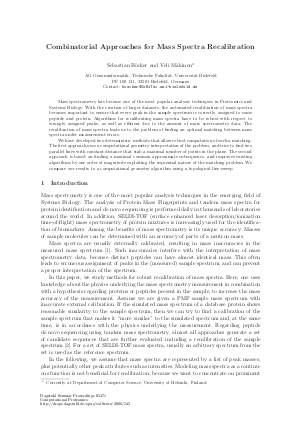Combinatorial Approaches for Mass Spectra Recalibration
Authors Sebastian Böcker, Veli Mäkinen
-
Part of:
Volume:
Dagstuhl Seminar Proceedings, Volume 5471
Part of: Series: Dagstuhl Seminar Proceedings (DagSemProc) - License:
 Creative Commons Attribution 4.0 International license
Creative Commons Attribution 4.0 International license
- Publication Date: 2006-05-03
File

PDF
DagSemProc.05471.5.pdf
- Filesize: 125 kB
- 6 pages
Document Identifiers
Subject Classification
Keywords
- Mass spectrometry recalibration computational geometry
Metrics
- Access Statistics
-
Total Accesses (updated on a weekly basis)
0Document
0Metadata
Abstract
Mass spectrometry has become one of the most popular analysis techniques in Proteomics and Systems Biology. With the creation of larger datasets, the automated recalibration of mass spectra becomes important to ensure that every peak in the sample spectrum is correctly assigned to some peptide and protein. Algorithms for recalibrating mass spectra have to be robust with respect to wrongly assigned peaks, as well as efficient due to the amount of mass spectrometry data. The recalibration of mass spectra leads us to the problem of finding an optimal matching between mass spectra under measurement errors. We have developed two deterministic methods that allow robust computation of such a matching: The first approach uses a computational geometry interpretation of the problem, and tries to find two parallel lines with constant distance that stab a maximal number of points in the plane. The second approach is based on finding a maximal common approximate subsequence, and improves existing algorithms by one order of magnitude exploiting the sequential nature of the matching problem. We compare our results to a computational geometry algorithm using a topological line-sweep.
Cite As Get BibTex
Sebastian Böcker and Veli Mäkinen. Combinatorial Approaches for Mass Spectra Recalibration. In Computational Proteomics. Dagstuhl Seminar Proceedings, Volume 5471, pp. 1-6, Schloss Dagstuhl – Leibniz-Zentrum für Informatik (2006)
https://doi.org/10.4230/DagSemProc.05471.5
BibTex
@InProceedings{bocker_et_al:DagSemProc.05471.5,
author = {B\"{o}cker, Sebastian and M\"{a}kinen, Veli},
title = {{Combinatorial Approaches for Mass Spectra Recalibration}},
booktitle = {Computational Proteomics},
pages = {1--6},
series = {Dagstuhl Seminar Proceedings (DagSemProc)},
ISSN = {1862-4405},
year = {2006},
volume = {5471},
editor = {Christian G. Huber and Oliver Kohlbacher and Knut Reinert},
publisher = {Schloss Dagstuhl -- Leibniz-Zentrum f{\"u}r Informatik},
address = {Dagstuhl, Germany},
URL = {https://drops.dagstuhl.de/entities/document/10.4230/DagSemProc.05471.5},
URN = {urn:nbn:de:0030-drops-5455},
doi = {10.4230/DagSemProc.05471.5},
annote = {Keywords: Mass spectrometry recalibration computational geometry}
}
